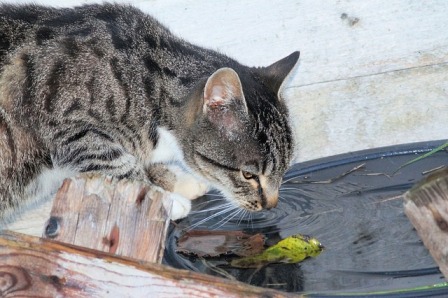Can Cats Eat Fish?
Can Cats Eat Fish?
The idea of cats eating fish is pretty old and common, even though a majority of today’s domestic cats come from the African ancestors, which had lived in the desert, hunting rabbits, mice and rats. The truth is that nobody is sure why the idea about fish as favorite cat’s food is still alive today. This seems even more absurd if we remind ourselves of cat’s aversion to water. However, many cat owners report that their pets like as much fish as meat, and in some cases, cats become completely enhanced by the fish’s taste and smell. Despite all health benefits, we know that consuming fish has on our health, feeding cats with raw fish should be considered carefully. Namely, raw fish is rich in thiaminase, an enzyme that prevents cats from absorbing thiamine, a vitamin necessary for cat’s immunity and good health condition. The second reason against feeding cats with raw fish lies in its allergens; they can significantly affect cat’s health. The article “Is It Safe for Your Cat to Eat Fish?” explains how prepared and what portion of fish is optimal to a cat.
Can Cats Eat Fish?
? Fish should form only a fraction of your cat’s diet. Fish is not nutritionally appropriate for a cat. Fish are not a part of cat’s natural diet. With the
rare exceptions of some wild cat species, cats do not eat fish in the wild, nor did their evolutionary ancestors eat them. Therefore, their development as
a species did not depend on fish as a food source. Fish is deficient in certain minerals, such as calcium, sodium, and iron. It also contains excessive
amounts of phosphorus. Of course, that is not a problem if fish is only an occasional treat to your cat, amounting to no more than 10% of total food
intake.? Fish bones must be removed, as they may damage or obstruct your cat’s throat or gastrointestinal tract. If you say us that your cat gulps whole fish and
is okay, we believe you. Many cats do that. Actually, most cats that are seen in our practice with fish bone obstructions are said to do it for years with
no problems. Unfortunately, even if you remove the fish bone, keep in mind that smaller bones still can cause problems. They are hard to remove; cooks use
tweezers. Would you do that for your cat?? Fish should be cooked. Yes, we are fans of feeding raw foods to cats. However, when it comes to fish, it is better to stay on the safe side. Raw fish
contain an enzyme that breaks down Vitamin B1 (thiamine). Signs of thiamine deficiency include anorexia, loss of coordination, vestibular disorders,
aggression, and seizures. Almost all cats who are diagnosed with thiamine deficiency are reported to consume significant amounts of raw fish, such as
carp, herring, pike, cod, mullet, and others. Besides thiamine deficiency, raw fish are also a common reason why cats get parasites. Did you know there
are several ways that even indoor cat can get worms?? Avoid tuna and other fish in oil. Oiled products, such as tuna and other fish in oil, are not regular, commercial cat foods, but many cats receive them as
frequent treats. They contain a high amount of polyunsaturated fats. They promote a relatively common medical condition, pansteatitis, which is also known
as yellow fat disease. Signs of pansteatitis include anorexia, depression, poor coat quality, hypersensitivity, abdominal pain, and death. Cat owners
often first complain about their cat becoming aggressive when being picked up, and only then discover that it’s because of tuna in oil. Sounds ridiculous,
right?
As we can see, feeding a cat with fish can have some side effects. On the other hand, fish is highly rich in protein and that is why experts recommend fish as a part of a regular diet. It is advisable not only for humans, but also for cats. According to nutritionists, DHA, an omega 3 fatty acid, represents a specific sort of fish oil that takes part in developing the brain’s structure. There is strong evidence that fish oil is beneficial for good eyesight and can benefit older cats that suffer from joint stiffening. Fish oil also helps cats against inflammation. Thus, finding a good balance and proper quantity of fish in a cat’s diet can benefit hugely its health. Expert advice is 2-3 times per week. Properly prepared fish without salt would be a wise choice. If our cat does not prefer cooked fish, we can freeze it for seven days at a temperature of -20?C (-4?F). The freezing process will remove bacteria from fish and make it safe for feeding a cat. As a result, our cats will eat bacteria-free fish and get the most of its ingredients, which can be lost during cooking.










